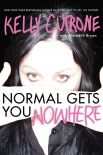Normal Gets You Nowhere, Kelly Cutrone [self help books to read TXT] 📗

- Author: Kelly Cutrone
Book online «Normal Gets You Nowhere, Kelly Cutrone [self help books to read TXT] 📗». Author Kelly Cutrone
I request your presence at my deathbed,
because I love you and honor the time we’ve shared.
Please join me, won’t you, and don’t be scared.
Love, Kelly
Date: to be determined. Dress code: black.
Please RSVP to lastdays@peoplesrevolution.com.
This invitation is nontransferable and admits one.
As souls pass into and out of the body, the charms and riddles of the universe are subtly illuminated, and lessons are effortlessly integrated. Just being in the room when loved ones are born or die bestows upon us an understanding of things that words cannot explain—and it’s in these inexplicable things that the true and real magic of life lives.
I am suggesting that we treat our death and those of our loved ones the way we’d treat a very special wedding or birthday, i.e., with careful planning and production. By this I don’t mean we should plan how we’ll die—I refuse to attend funerals of suicide victims—but what will happen as we are dying, and after we die.
I’m a publicist, so I’ll tell you right now what makes for a great event. First, you need a venue. Where will you be? If you’re in a hospital, will you be in a private or shared room? What type of music will be played? What kind of drugs will you get? (It’s no different than an open bar at your wedding, except this time you won’t have to pay the bill!) Perhaps you also want a theme, great lighting, and visuals.
Oh, do you think I’m being morbid? No, I’m being practical. I mean, when you have a baby, there are birthing rooms, classes, soundtracks. Unfortunately, this chapter is probably the closest you’ll get to a cool death class, so listen up. I want you to think about this not just for yourself, but also for the ones you love.
A cautionary tale. As my father lay dying last year in Virginia, wheezing in bed and looking like a dead branzino on ice in a fish market, one of his hospice nurses waltzed in and said, in a thick Southern accent, “Lee, you’re still here, that must mean Jesus still has work for you to do!”
Hearing this, I dragged her out into the hallway by her arm. “You know what Jesus wants my father to do?” I said. “He wants him to die. Stop doing this to him.” I really suggest you get a great door person at your death to avoid this (my father hadn’t appointed me, but luckily, I happened to be there to do the honors).
Why leave anything to chance just because you don’t yet know the exact date of your last great event? I do want everyone to live a very, very long life. I just think that when the time comes, there should be a clear list of who’s allowed to be present and for how long. Who do you want there, and who do you not want there? Who have you told this information to? I get it. I wear all black, I’m forty-five and a Scorpio. But if someone called me to say, “Listen, I don’t know where you’re going to be in this world when I die, but I want you to know that you’re invited to be there”—well, that’s one of the sexiest things anyone could ever say to me.
The truth is, I don’t think it’s ever too early to think about these things, whether you’re sixteen, twenty-one, or sixty-one. You may be in perfect health, but do you ride a bike in New York City? Well, what happens if you smash into the cement head-on? To what lengths do you want doctors to go to keep you alive? And if you don’t make it, who will be speaking on your behalf at your funeral, and will you and your God be properly represented? We shouldn’t just ask these questions of ourselves, but also of our mothers, sisters, and our tribal elders. We need to organize tribal counsel meetings with our parents, our grandparents and partners.
We live in a time when everyone is silently texting all day, but we’re not connecting enough as human beings and having the important conversations. Planning our deaths, like the deaths themselves, is a beautiful opportunity for truth, intimacy, and vulnerability. We all have a bakery number with our name on it, and it’s better to acknowledge that now and spend a couple hundred bucks downloading a living will for everyone in the family than to wait until we or one of our parents gets sick.
If you don’t have a living will, you are a stupid motherfucker.*
Being in control of our lives until the very end is being responsible and independent, and it is free.
Millie, Billy, and a Mercedes Hearse
Good-bye, Papa, it’s hard to die
when all the birds are singing in the sky.
—From “Seasons in the Sun,” by Terry Jacks
I used to think death was terrifying too, if I ever thought about it at all, which, growing up, I really didn’t. Who did? My biggest problems before my grandfather got sick were why my boyfriend wasn’t calling me back and how I was going to repay my student loans. These, to me, were life’s big issues. But at the age





Comments (0)